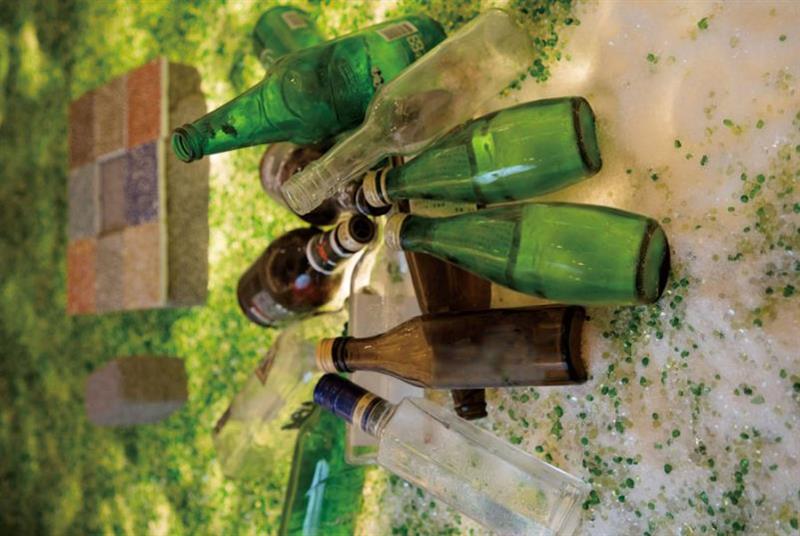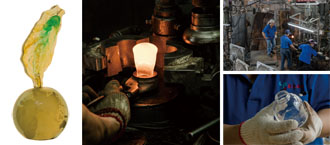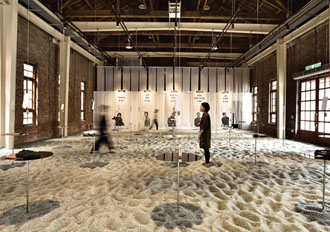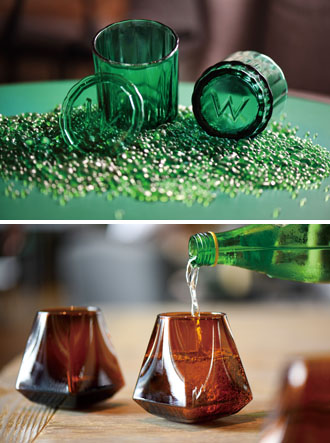

2018-12-24瀏覽數:3421

資料來源:https://taiwantoday.tw/news.php?post=144221&unit=14,34
外交部 Taiwan Review雙月刊 11月
A glassworks is firing up Taiwan’s circular economy with imaginative ways of reusing waste bottles, flat-panel screens and windows.
Amid the hum of machinery and the roar of furnaces, half a dozen workers dressed in uniforms of blue polo shirts and jeans shaped and spun molten glass into various objects. Among them was the factory’s latest product in its W Glass Project range, a handcrafted drinking straw made from 30 percent recycled glass. Retailing for NT$480 (US$16) a pair, the straws are a response to the government’s progressive new environmental policy on phasing out single-use plastics.
Spring Pool Glass Industrial Co. in northern Taiwan’s Hsinchu City launched the W initiative in 2017 to develop innovative applications for recycled glass. “We use straws every day, so they’re an ideal product for this project because they’ll help spread the concept of creative recycling,” said Wu Ting-an (吳庭安), head of the company’s R&D department. Demand for reusable options is likely to rise once the country starts banning disposable plastic straws in stages, beginning July 2019.
Visionary Work
The project, which is Wu’s brainchild, is in line with the government’s five-plus-two industrial innovation program. A key plank in the government’s national development strategy, the initiative aims to foster the biotech and pharmaceuticals, green energy, national defense, smart machinery and Internet of Things sectors, as well as the circular economy and a new paradigm for agricultural development.
Impressed with his visionary work using recycled glass, the Ministry of Economic Affairs selected Wu as one of four winners of the Presidential Innovation Awards in 2018. The biennial contest is intended to encourage Taiwan citizens and organizations to think outside the box in designing new methods and products that will bolster the country’s economic restructuring.

Spring Pool’s artisans create a wide variety of artworks and everyday objects from recycled glass. (Photos by Chin Hung-hao)
Recycling is in Wu’s blood. Spring Pool is a family enterprise—his father founded the waste glass company in 1981. Today, it is the largest firm of its kind in Taiwan, handling about 100,000 metric tons of glass a year. Around 70 percent of the country’s discarded glass passes through its factory in a nation where the glass recycling rate is 90 percent. The company sorts, cleans and crushes the material into chips and then sells them on to manufacturers from home and abroad. A small amount is retained and remade into a wide variety of products from bottles to artworks.
Recycling glass is environmentally friendly on several levels because it means less waste and it is also cheaper and cleaner than producing the material from scratch, Wu said. Depending on the ratio of other additives, the kiln can be up to 200 C cooler, which results in lower fuel consumption and greenhouse gas emissions.
Glass Houses
After studying resources engineering at National Cheng Kung University in southern Taiwan’s Tainan City and earning a master’s degree in industrial management from the University of Cambridge in the U.K., Wu worked for a high-tech company in Hsinchu for a few years. In 2012, bursting with ideas, he joined his father’s firm.
His first project was finding a use for all the LCD screens from discarded computers, cell phones and TVs. These panels are difficult to recycle because they contain aluminum oxide, which raises their melting point and makes them more expensive and polluting to process. Wu realized that this feature made them ideal for something else: fire-resistant building materials. “We turned its disadvantage into an advantage,” he said.

Visitors to Creative Expo Taiwan in 2017 wade through a sea of recycled glass beads. (Photo courtesy of Wang Te-fan and Spring Pool Glass Industrial Co.)
The blocks, which are patented in Taiwan and the U.S., are also lightweight and sound and heat insulating. They are composed from 70 percent recycled glass mixed with concrete. In 2015, they were verified as fire resistant for two hours and accredited as a green building material by Germany-based TUV SUD, one of the world’s leading testing, inspection and certification companies.
Spring Pool has been making the blocks commercially since 2013 and sells them to construction firms in Taiwan and overseas, with the two main export markets Singapore and Malaysia. They now represent 25 percent of the company’s revenue with sales of processed waste glass accounting for 50 percent and the remainder coming from other products.
Without Limits
Through his W Glass Project, Wu is using circular economy concepts to upcycle waste materials into exclusive objects. W has multiple connotations, he said. It can refer to waste but it also stands for “wu” in Chinese, meaning to “not have” and implying no limits should be put on how to use recycled glass.
To this end, the researcher and entrepreneur has collaborated with a diverse range of professionals. Michelin-starred chef Andre Chiang (江振誠), who runs RAW, an upmarket restaurant in Taipei City, helped Wu create elegant tableware. Then there is Joe Fang (方序中), a visual designer who drew the blueprint for a glass bottle bearing the handprint of Singaporean pop star JJ Lin (林俊傑) that was given away with his CD.

Drinking glasses with lids that double as small plates for eating mooncakes and tumblers in the shape of lanterns are some of the designer items jointly produced by the company and high-end hotel W Taipei. (Photos courtesy of W Taipei)
In April 2017, the company was invited to participate in Creative Expo Taiwan, an annual event in Taipei since 2010 aimed at showcasing the nation’s cultural and creative sector. Spring Pool exhibited an installation called “Circular Economy Ocean.” Visitors were encouraged to wade barefoot through a sea of recycled glass beads spread over the floor of an exhibition space.
The display so impressed the management of high-end hotel W Taipei that it asked Wu to recreate it next to its 10th floor open-air swimming pool. “Spring Pool’s installation is really unusual and inspiring, so we wanted to give more people a chance to experience it,” hotel manager Vivian Lin (林芸慧) said.
Wu continued to work with the five-star establishment in creating drinking glasses shaped like lanterns and mooncake gift boxes with covered drinking glasses whose lids can serve as small plates for the delicacy traditionally eaten during Mid-Autumn Festival. The gift boxes, created by Taipei-based Piliwu Design Studio, made the list of finalists for the 2018 Golden Pin Design Award. The contest, organized by the government-supported Taiwan Design Center, rewards innovative concepts and products.
In August, Wu used crowdfunding platform Zeczec to raise money for the straw and a project to make beer glasses with an unusual rubber band design. The pitch was aimed at people interested in getting involved with environmentally friendly initiatives. By the end of September he had raised NT$900,000 (US$30,000), surpassing his initial NT$200,000 (US$6,670) target.
This kind of public support, along with his Presidential Innovation Award, is all the encouragement Wu needs to plow ahead with more imaginative endeavors. “The W Glass Project is just a small part of what it’ll take to give Taiwan a more sustainable future,” he said. “But I’m going to keep exploring new ways to use waste glass and make an even bigger contribution.”
Write to Oscar Chung at mhchung@mofa.gov.tw